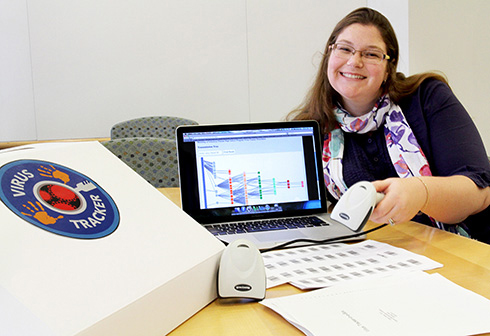Passion for Virus Tracker in a Box is contagious for kids who want to learn more about bioscience

The late Victorian poet Alfred Lord Tennyson may have declared, “I am a part of all that I have met,” but a novel classroom tool created by researchers at the Virginia Bioinformatics Institute at Virginia Tech may be the first to make students actually believe it.
Virus Tracker In a Box allows students to use bar-coded wristbands to follow the path of a virus in real time, from an initial infection to a schoolwide “epidemic,” revealing that the total number of people someone "affects" can be much greater than just those they directly "infect."
The Virus Tracker program is a part of a larger effort being pursued by the institute’s Network Dynamics and Simulation Science Laboratory involving activities in computational epidemiology to understand how diseases are transmitted over distance and time.
By using computer models, big data, and novel decision support systems, the researchers avoid the expense and risk of experimenting with actual infectious diseases.
In the Virus Tracker game, players become part of a virtual virus-spreading exercise in which bar-coded wristbands represent infections with a particular virus.
The first person to be infected is known as “patient zero.” He or she can choose how many others to infect by giving away wristbands.
People receiving the next round of bands choose how many others to infect, and so on, until all bands are dispersed.
Each game kit includes a scanner to enter the bar codes into a database that displays the resulting “transmission tree,” as well as other statistics about the virtual epidemic.
Participants can find their places in the tree, and trace the path backwards to find “patient zero.”
“We are excited to bring this technology and educational experience to classrooms and informal education venues around the nation. The project brought together the institute’s software developers with the scientists at our Network Dynamics and Simulation Science Laboratory, as well as Franklin County, Virginia teachers, to produce the Virus Tracker in a Box software and curriculum package,” said Kristy Collins, a K-12 program specialist, and Kids’ Tech University director at the institute.
Sixth-grade health teacher Randy Miskech from Wilmington, N.C., has been pleased at the effect Virus Tracker in a Box has had on his students.
“The Virus Tracker in a Box System is 21st century learning at its best,” Miskech said. “This system has allowed me to step away from multiple choice, true-false questions and look at a real world application and apply it to hands on learning.”
Misketch said his students took control of the game, setting up computers and mobile laptops, “infecting” students, and gathering and analyzing data.
Miskech also notified school administrators “and to my delight, they came down and were willingly exposed to the virus. What a joy for the students, creating relationships with the principal and other staff.”
Educators can acquire Virus Tracker In a Box via an online form and the materials, along with a tailored curriculum packet, will be shipped as they become available.
In addition to the game, the package includes:
- A crash course in biology that walks students through the characterization of life and explores how viruses can highjack our genetic code and potentially change our DNA.
- An exercise where students can develop their own creative model of a virus.
- An exercise on epidemiology and the retrovirus HIV, where students are given vials representing “bodily fluids” and a solution is pipetted into the vials. The teacher then places a drop of phenol red in each vial as students watch as their solution turns red (infected) or yellow (not infected). Students then begin the “Hunt for HIV,” working backwards to find patient zero.
The project was funded from National Institute of General Medical Sciences, administered through the MIDAS Network, grant number: U01 GM070694-09, Dr. Kristy Collins and Dr. Stephen Eubanks, the National Science Foundation, grant number: CNS-1011769, Dr. Madhav Marathe and VBI, and the Fralin Institute at Virginia Tech.




